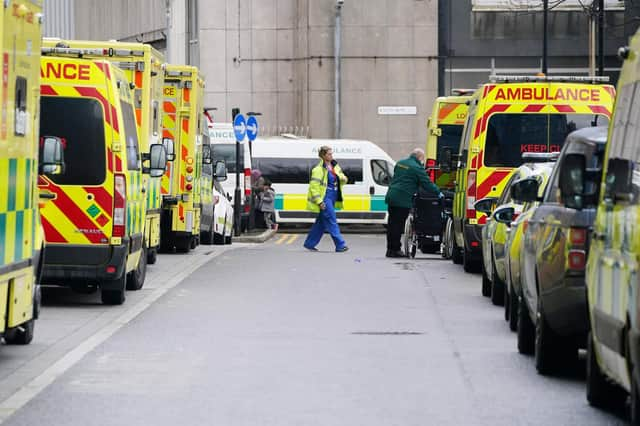Nightingale contingency ward to be constructed in Leeds hospital car park amid Omicron surge


As medics across England are preparing for an expected increase in Covid patients, eight hospitals across the country are putting in place so-called Nightingale surge hubs.
Yesterday an additional 183,037 Covid cases were confirmed across the UK, and it was revealed that more than 10,000 people across England with Covid are receiving hospital care.
Advertisement
Hide AdAdvertisement
Hide AdLeeds St James University Hospital is among those preparing a contingency Nightingale facility, which will take patients amid the expected surge in patients in the coming weeks driven by Omicron.
Leeds St James University Hospital is among the eight across England preparing a facility, which will take patients amid the expected surge in patients in the coming weeks driven by Omicron.
The Yorkshire Post understands that the hub will be in a staff car park, and work on construction is expected to begin early in the New Year.
Yesterday, Boris Johnson said he had "talked to doctors who say the numbers are running up to 90 per cent of people in intensive care who are not boosted.”
Advertisement
Hide AdAdvertisement
Hide AdThere are no official NHS figures on the vaccination status of people in intensive care but medics have warned the vast majority are either unvaccinated or have not had all their doses.
The NHS is now on a “war footing” according to NHS National Medical Director Stephen Powis and the new Nightingale facilities will be on hospital grounds, allowing staff to work flexibly if the sites are needed.
They will take patients who have not yet been judged to be fit for discharge, but need minimal monitoring while they recover. They could include people who are recovering from Covid and are no longer infectious.
If hospitals need the bed spaces after all other options have been exhausted, machinery from the earlier Nightingale hospitals will be sent to them quickly.
Advertisement
Hide AdAdvertisement
Hide AdThe move will free up regular ward beds for those who need more intensive support.
As well as the Leeds project, there will be Nightingale surge hubs in Preston, Solihull, Leicester, Stevenage, London, Ashford and Bristol.
As of 8am yesterday, a total of 10,462 people were in hospital in England with Covid-19, according to NHS England figures.
This was up 48 per cent from a week earlier and is the highest number since March 1.
Advertisement
Hide AdAdvertisement
Hide AdThere were 1,751 Covid-19 hospital admissions in England on December 27, NHS England said.
This is up 65 per cent week-on-week and is the highest number since February 5.
The new variant now makes up almost all cases in England, with as much as 90 per cent of community spread across the country attributed to Omicron.
As cases continue to soar, Prime Minister Boris Johnson yesterday warned people in England to go about their New Years celebrations cautiously and take precautions,
however, tests have been difficult to get hold of.
Advertisement
Hide AdAdvertisement
Hide AdDespite urging people to get tested before they party, both PCR and lateral flow slots have been hard to come by online.
A UK Health Security Agency spokesperson said almost eight million test kits would be made available to pharmacies by New Year’s Eve and urged people to keep checking the Gov.UK website every few hours.
They said: “We are delivering record numbers of lateral flow tests to pharmacies across the country, with almost eight million test kits being made available to pharmacies between today and New Year’s Eve.
“We have made 100,000 more PCR booking slots available per day since mid-December and we are continuing to rapidly expand capacity – with over half a million tests carried out on 23 December alone and delivery capacity doubled to 900,000 PCR and LFD test kits a day.”
Advertisement
Hide AdAdvertisement
Hide AdMinisters and medics are continuing to push the booster drive, data released yesterday showed that more than 800,000 booster or third doses were administered over the Christmas break.
A total of 33,091,891 extra doses had been delivered as of December 28 – the first time a UK-wide figure has been available since December 23, when the number stood at 32,290,487.
It means 801,404 booster and third doses were added across the five days from Christmas Eve to December 28.
Around 62 per cent of adults in the UK have received a booster or third dose, with as many as 65 per cent in Scotland.
